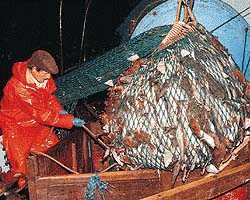|
Fish consumption and aquatic ecosystems
Consumption of fish and fishery products (such as fish meal and fish oils) has risen by 240 percent since 1960 and more than fivefold since 1950. Intensive fishing effort has led to the collapse of many important commercial fisheries in the northern hemisphere and pressures are now mounting on southern fisheries.
Overfishing, pollution, and disturbance of marine habitats have reduced the productivity of many coastal zones, where some 90 percent of the world's fish harvest is caught.
Marine harvests of fish appear to have peaked and now account for a declining share of total production.
Aquaculture, or fish farming, has become increasingly important and now provides more than one-quarter of all fish destined for human consumption.
Demand for food fish is projected to increase by at least 34 per cent, and probably by nearer 50 per cent, by 2010. Analysts are virtually unanimous that this level of consumption cannot be met if current production trends continue unchanged.
The world's few remaining productive fishing grounds will be fished out in their turn and total marine harvests are expected to fall from today's levels.
Aquaculture production, even under the most optimistic growth projections, would not be able to fill the gap
Scarcity will cause fish prices to rise and encourage more international trade.
This, in turn, will favor subsidized industrial fishing fleets which supply relatively wealthy markets, at the expense of small-scale, subsistence fishers.
Nearly one billion people, most of them in developing countries, currently depend on fish for their primary source of protein. This source is likely to dwindle away within a generation. The outlook for food security and employment among low-income coastal countries could hardly be more serious.
For about one billion people, seafood is the primary
source of animal protein. Fish products are also an
important source of protein in animal and fish feeds.
In 1950, the global fish harvest had risen to 21
million tonnes. By 1996, the global harvest of fish
rose to a new record of 121 million tonnes. Some
of the most profitable species of fish have been
fished to the brink of commercial extinction in
many areas. There is now a rapidly growing
consensus among fisheries experts that the
precipitous decline in so many of the world's
commercial fish stocks is the result of disregard
for the complex functioning of aquatic ecosystems
and repeated failures of management.
|
